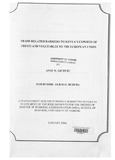| dc.description.abstract | Horticulture has been identified as the fastest growing agricultural sub-sector in Kenya,
second only to tea as foreign exchange earner. The sub-sector contributes significantly to
the Gross Domestic Product (GDP) and employs over one million people directly and
indirectly. The horticultural produce exports have also been rising despite the increase in
implementation of tariffs in the global market especially in the European Union (EU).
The flower industry has been the mainstay of horticultural exports, but recently, the
market for fruit and vegetables exports has expanded. This paper highlights the barriers
that Kenyan export organizations face in their endeavour to penetrate the European fruit
and vegetable markets
A total of 80 exporter organizations were selected using the stratified random sampling
procedure out of which 58 organizations returned fully-filled questionnaires within the
prescribed period. The data was analyzed using descriptive statistics in the form of
percentage tables and pie charts. The study noted that both the tariff and non-tariff
barriers affected the export of fruits and vegetables to the EU market. The barriers both
tariff and non-tariff resulted in an increase in the export costs and made the exports to
become uncompetitive in the EU market due to their quality or cost. Despite this, the
study also noted that the Kenyan government had initiated some programmes to address
the barriers and enable the exporters compete effectively in the EU market.
Based on the findings of the study, it is recommended that there is still need for the
government to intervene further especially by reducing government taxes, offering
subsidies and providing information·to the exporter organizations. In addition, the export
organizations need to invest in programmes that will assist them in overcoming the
barriers such as adherence to the required standards. These initiatives will enable the
exporters to compete effectively in the EU market and thus earn the country the much
needed foreign exchange. | en |

